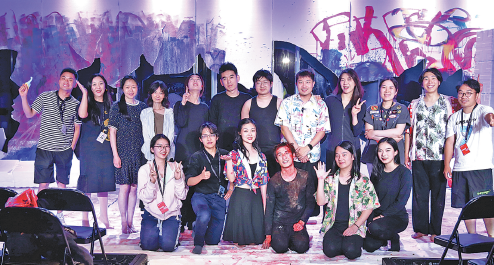Time for a bigger stage

Creators of Mister Non-existence in Utopian pose for a group photo at the 2023 Aranya Theater Festival in Qinhuangdao, Hebei province. CHINA DAILY
Talent and interest is awash in the Chinese theater world, but barriers still exist for young budding theater professionals aspiring to carve out a path in this important creative industry, Gui Qian reports.
Just how far apart are the worlds of campus and commercial stage theater? For the theatrical show Mister Non-existence in Utopian by the Master of Arts Troupe of Nanjing University in Nanjing, Jiangsu province, it took two years to bring them together. And for most members of the troupe — also the inventors of the show — going from students of theater to theater professionals is an ideal that is visible, sometimes reachable, but hard to uphold.
Mister Non-existence in Utopian was displayed at this year's Aranya Theater Festival in Qinhuangdao, Hebei province, on June 16 and 17, before which it enjoyed three performance cycles at Nanjing University. It's rare for a student-made work to be a headline show at one of China's most anticipated theater events.

Han Jing CHINA DAILY
The show was first written by 23-year-old Han Jing in 2021.Like many members of the Master of Arts Troupe of Nanjing University, Han is a student of the university's Department of Theater, Film and Television Arts. The troupe is also where the 2012 theater hit The Face of Chiang Kai-shek was born. The play later went on tour both at home and abroad, winning various awards. And it is held up as an inspiration by next generation of students of the theater troupe.
Han's show is a satirical comedy that portrays the absurdity of four different groups of people — college students, laborers, rich and powerful people and the middle class. They meet at a theater festival in a wealthy neighborhood. While they are forming a performance, interference and conflicts emerge.

Hong Rui CHINA DAILY
The story of Mister Non-existence in Utopian perfectly echoes the reality of the Aranya Theater Festival. However, for the show's creators, they observed stark differences between performing at the university and at the commercial event.
According to Hong Rui, 22, one of the show's leading actors, the audiences they faced were very different. "At school, our viewers were mostly students who were interested in theater. After watching the show, they would give many detailed and constructive comments and suggestions. Here in Aranya, the audience came from all walks of life and had different tastes," he said. In order to successfully run the show in a big theater festival, Hong said that the team needed to deal with many individuals and organizations outside of school, including the festival's organizers, the neighborhood's managers and even the estate proprietors.
Jiang Zhiyuan, 27, a leading actress and the assistant director of the show, agreed that these changes were also challenges faced by theater students in their transition to becoming professional practitioners in the industry. After graduating from the same department as Han at Nanjing University, Jiang studied overseas at the University of Leeds, UK, for her second master's degree, majoring in global performance and cultural industries.
Jiang found that our domestic theater education schemes need improvements to better help with this transition. She took the role of theater producers as an example. "Being a theater producer requires you to have a sense for both the market and art. You need to know how to help directors search for gigs, manage human resources, schedules and most importantly, money," Jiang said. "But we lack a cultivation system for theater producers."
She also noted that student theater groups should be given the opportunity to run troupes independently. "It would be best if they get to practice applying commercial logic in advance. For example, they should be allowed to sell tickets, even at low prices," she said.
In the eyes of Han, the theater industry itself has its own limits at present. "It's not big or open enough to include more newcomers," she said, explaining that student theater groups can survive by applying for art funds, awards and festival projects — but only barely.

Jiang Zhiyuan CHINA DAILY
"We are already lucky as we benefit from our senior alumni's The Face of Chiang Kaishek, whose commercial success has supported many later works made by our troupes."
Facing all these challenges, many theater students decide not to enter the theater industry when they finish school. Among her 25 university classmates, Han is the only one who has kept creating theater productions after graduation, and she plans to pursue further academic development in theater after getting her master's degree.
"Although I cannot support myself by making theater productions for a living, I still keep making them," she said.
It's a similar situation for Hong and Jiang. They are trying to stay close to the field they love as they prepare to apply for theater-related master's and PhD degrees, respectively.
Although they have concerns for the future of the theater industry and themselves, they don't fail to see the silver lining of this art form.
"Many people only see campus theaters as a stepping stone to creating more mature works but I don't see it this way. These theaters themselves are a genre that is defined and distinguished by young creators' rawness and passion, which are unique to a certain group," said Hong.
And according to Han, the noncommercial essence of campus theaters gives students more space to try edgy theatrical methods and lowers the threshold for young people to get a taste of theater.
"I just hope more people can be included in the world of theater, as both creators and audiences," she said.


 Jiangsu college students tell inspiring campus stories
Jiangsu college students tell inspiring campus stories